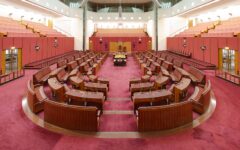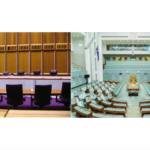Kimberley Kitching’s Death Highlights ‘Mean Girls’ Culture in Australian Politics, Mainstream Media Claims

Since the #MeToo movement began several years ago, the focus on workplace harassment has been very much along the lines of how some men treat women. And that’s not to be disputed – it is backed up by statistics and acknowledged as an issue across all industries.
But mainstream media outlets have been reporting that recent events in Australian politics suggest that women in power can behave with just as much toxicity towards men, and towards each other.
Media outlets have gone so far as to report that toxic behaviour by women in the halls of power contributed to the death of Senator Kimberley Kitching, who it has been reported was under significant stress in the days leading up to her fatal heart attack.
According to Ms Kitching’s colleagues, the fact her political future was still not resolved was weighing heavily upon her. All others, with the exception of Ms Kitching’s and with former minister Kim Carr’s preselection — had been decided by November 2021.
This meant the future of Ms Kitching’s career was uncertain.
Bullying and shaming
Much has also been published in recent times about the so-called “mean girls” of the Labor Party – particularly at the hands of Penny Wong, Kristina Keneally and Katy Gallagher,.
Reports assert that such conduct resulted in the shaming, ostracism, bullying and belittling of Ms Kitching, under the watchful eye of other men and women, who it is said did little or nothing to call out the behaviour.
Unfortunately, Ms Kitching is no longer here to tell her side of the story. And these may well reports may well be yet another case of the mainstream media demonising the Labor party in the lead-up to an election.
Indeed, Penny Wong, Kristina Keneally and Katy Gallagher have issued a joint statement denying that any such bullying occurred.
And for his part, Labor Leader Anthony Albanese has downplayed claims of nasty politics – although nastiness is perhaps systemic in both major political parties.
Calls for a Workplace Review
In any event, there are calls for a Workplace Review into the way Ms Kitching was treated by her peers, including the alleged lack of response from the people to whom she turned for help.
It’s been reported that Victorian Labor MP Richard Marles knew Ms Kitching was under enormous stress resulting from the way she was being treated, and that she asked him for help last year.
But when recently questioned by journalists, Mr Marles did not admit being so asked, adding he want to debate the matter as it was “too soon” after the Senator’s passing.
The question that may be asked is: is it really too soon, or is it, in fact, too late?
Toxic politics
Another question that may be asked is, why hasn’t there been an investigation of any sort given the amount of information that’s circulating in the public domain? Some have even expressed the view there would have been an immediate outcry if those accused had been men.
But bullying and harassment need to be divorced from gender. Any person who treats another badly, to the point where they feel the need to ask another colleague for help, or make a complaint, irrespective of gender, should be called to account.
While many political commentators have also brushed aside the allegations of toxicity, calling the stress faced by Ms Kitching as ‘part of the job’ and the ‘nature of politics’ it’s disturbing to taxpayers that these stories keep making the news.
They’re more than sensational headlines…. As the old saying goes: “where there is smoke, there’s likely to be fire.” And we know, from everything that’s been aired about the Morrison Government, particularly in the past two years, since the allegations of sexual assault made by Brittany Higgins, that there is a massive problem with the culture of politics in this country.
These toxic “power plays” are evident in state politics too.
If politicians were actually more respectful of one another, while still arguing passionately for their constituents, no matter what side of the political divide they’re on, would they actually accomplish more?
It’s definitely time to be having open and frank conversations about bullying and harassment and the wider problems it causes – not just the direct implications for those who are victims of the behaviour who can suffer depression and even Post-traumatic Stress disorder, because the social climate is more than ready and receptive to it.
But it’s also time for Australians to ask themselves whether this is really what we want from our government representatives. There is a way to lead, without being mean. In the past couple of decades a whole global industry has sprung up – consisting of books, videos, training courses, executive coaching – offering education and information about how to lead with effectiveness and integrity.
More of the same?
Unfortunately, while Anthony Albanese’s original tight-lipped response on the allegation’s surrounding Ms Kitching’s death might have seemed respectful, as time wears on, it seems like just another classic political PR strategy – side-stepping the issue – the basic premise of which is that the less focus is placed upon the issue, the faster it will go away. After all, budget announcements are looming and there is campaigning to be done.
But, also unfortunately this just reeks of “more of the same” from the federal politicians at a time when very many Australians are looking for change.
The University of Sydney published research last year that during the last federal election the Liberal party attracted the lowest number of votes from women since 1987.
It was made in the context of how the Liberal Party’s response to sexual assault and harassment within its party could affect it’s election outcome significantly.
For many women, as well as men, the way the Labor Party responds to the allegations of bullying and nastiness within its ranks could also influence public opinion.







